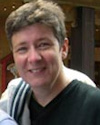
Deryn Guest
Biography
Deryn Guest was born in the heart of the blackcountry, in the United Kingdom. Women in the blackcountry had a reputation for chain-making and the production of nuts and bolts and her grandmother was involved in such work in Rowley Regis, West Midlands. She had five sons and her eldest, Deryn’s father, did his National Service in India in the Royal Engineers before becoming a Fellow of the Physics department at the University of Birmingham. Her mother was a housewife, actively involved in the Salvation Army and a local lay preacher.
Taken along to the Salvation Army from birth, Deryn had a much wider extended family drawn from the congregation and had a happy time being involved in musical and social activities. She played cornet in the band, accompanied singing groups on the piano, played guitar and yes, inevitably had a tambourine. Growing up in such a context gave Deryn a strong sense of community belonging and also a commitment to social justice that has remained with her through life. Feeling called to full-time ministry as a young teenager, Deryn’s application to become a Salvation Army officer was accepted when she was 18 and she spent two years of residential training between 1982-4.
This was also a difficult time. Having lived a relatively sheltered life Deryn had no (known) contact with lesbian or gay people and had no framework to understand her connection with women. Marriage was the expected route and, owing to the Salvation Army’s stance on homosexuality and the apparent impossibility of any publicly owned relationship with women, she married. She and her husband became Salvation Army officers and had two children. However, the pressures of this involvement took their inevitable effect; the marriage unravelled and Deryn left full-time ministry. This was a difficult time as the ministerial vocation had provided home and wage. Deryn had to return to her mother’s house with two children under three and consider what to do next.
What did happen next was night school, followed by a university application to study theology and, following that a Ph.D. at the University of Birmingham that was awarded in 1996. While studying for the Ph.D. she worked full-time at Westhill Teacher Training College, delivering modules on Greek and Hebrew, Biblical studies, and Women and Christianity. In the process of these years, Deryn came out, lived with the woman she had loved since being a teenager and eventually they became civil partners as soon as the legislation allowed in 2006.
Although her undergraduate degree programme had been a very traditional one, and despite doing a Ph.D. on the Book/period of the Judges, Deryn developed a keen interest in biblical hermeneutics. Her first book – When Deborah met Jael – was accordingly a study of what happens when lesbians interpret the Bible, and why a lesbian biblical hermeneutic is vital in a world where the Bible is used to not only condemn homosexuality, but to sanction violence against non-heterosexuals.
It became untenable to retain links to the Salvation Army given its position on loving the sinner and hating the sin – meaning in practice that any gay or lesbian-identified soldier would have to live a life of celibacy. In practice, the corps to which Deryn belonged operated a ‘don’t’ ask, don’t tell’ policy, but this is invidious and damages the soul. It took time, wandering around in a spiritual wilderness, but eventually Deryn found her way to a life-enhancing engagement with Wiccan spirituality. She practices a rather eclectic form of this but spirituality has remained a very important part of her life.
Deryn obtained her post at the University of Birmingham in 2002 where she teaches courses on biblical hermeneutics, specifically in the ways gender theory and queer theory is utilized in the interpretation of scriptural texts. Her work currently engages with the disciplinary boundaries of feminist biblical scholarship, problematising its agenda, methodologies and politics by pioneering a lesbian-identified hermeneutic. Her interest in theories of gender, sexuality, and race inform work on lesbian, gay, bisexual and transgender interpretations of scripture in a range of contemporary global contexts and the role of the Bible in contemporary political debate relating to lesbian, gay and transgender human rights. It is this integration of personal life with academic life that makes the work so fulfilling.
Since 2005, Deryn has published a range of queer-related essays including:
'From Gender Reversal to Genderfuck: Reading Jael through a Lesbian Lens' in Teresa J Hornsby and Ken Stone (eds) Bible Trouble: Queer Reading at the Boundaries of Biblical Scholarship Atlanta, Society of Biblical Literature, 2011, pp. 9-43;
‘Liturgy and Loss: A Lesbian Perspective on using Psalms of Lament in Liturgy’ in Stephen Burns, Michael N Jagessar and Nicola Slee (eds.) The Edge of God: New Liturgical Texts and Contexts in Conversation London: Epworth Press;
‘Encountering Beasts: Lesbian Biblical Hermeneutics on the Road’ Conclilium: International Journal for Theology 1 (2008) pp. 105-119; and
'Looking Lesbian at the Bathing Bathsheba' Biblical Interpretation: A Journal of Contemporary Approaches, Vol. 16, No. 3. (2008), pp. 227-262; The Queer Bible Commentary co-edited by Deryn Guest, Bob Goss, Mona West and Tom Bohache, SCM Press (2006).
(This biographical statement provided by Deryn Guest.)
Biography Date: December, 2011
Additional Resources
Tags
Salvation Army | WICCAN | Author/editor | Feminism | Trans activism | Women and Religion | United Kingdom
Citation
“Deryn Guest | Profile”, LGBTQ Religious Archives Network, accessed February 19, 2026, https://lgbtqreligiousarchives.org/profiles/deryn-guest.
Remembrances